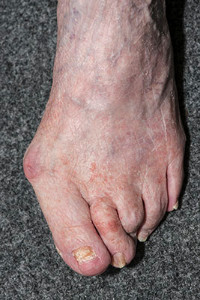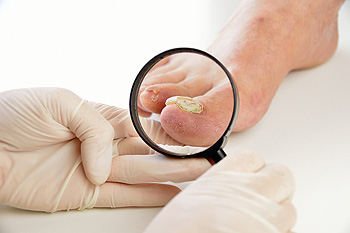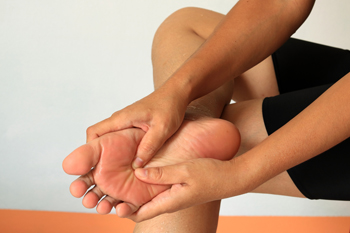
 A bunion is defined as a noticeable, bony bump that extends on the side of the big toe. It can gradually form as a result of wearing shoes that do not have adequate room for the toes to move freely in. Additionally, genetic factors may play a significant role in developing a bunion. Common symptoms that many patients endure often include pain, redness on or around the affected area, and there may be considerable discomfort while walking. Mild relief may be felt when larger shoes are worn that can accommodate the bunion, and it may be beneficial to wear custom made orthotics. If you see the beginning signs of a bunion, it is suggested that you consult with a podiatrist who can help you to determine what the correct treatment method is for you.
A bunion is defined as a noticeable, bony bump that extends on the side of the big toe. It can gradually form as a result of wearing shoes that do not have adequate room for the toes to move freely in. Additionally, genetic factors may play a significant role in developing a bunion. Common symptoms that many patients endure often include pain, redness on or around the affected area, and there may be considerable discomfort while walking. Mild relief may be felt when larger shoes are worn that can accommodate the bunion, and it may be beneficial to wear custom made orthotics. If you see the beginning signs of a bunion, it is suggested that you consult with a podiatrist who can help you to determine what the correct treatment method is for you.
If you are suffering from bunion pain, contact Dr. Edward D. Hutson of Easton, PA. . Our doctor can provide the care you need to keep you pain-free and on your feet.
What Is a Bunion?
Bunions are painful bony bumps that usually develop on the inside of the foot at the joint of the big toe. As the deformity increases over time, it may become painful to walk and wear shoes. Women are more likely to exacerbate existing bunions since they often wear tight, narrow shoes that shift their toes together. Bunion pain can be relieved by wearing wider shoes with enough room for the toes.
Causes
Symptoms
In order to diagnose your bunion, your podiatrist may ask about your medical history, symptoms, and general health. Your doctor might also order an x-ray to take a closer look at your feet. Nonsurgical treatment options include orthotics, padding, icing, changes in footwear, and medication. If nonsurgical treatments don’t alleviate your bunion pain, surgery may be necessary.
If you have any questions, please feel free to contact our offices located in Easton, and Northampton, PA . We offer the newest diagnostic and treatment technologies for all your foot care needs.
 Foot pain is considered to be a common ailment among many people. It can include pain in the toes, heel, and arch areas, which may be indicative of serious foot conditions. Toe pain can be a symptom of certain types of arthritis, bunions, or it may originate from an ingrown toenail. If there is pain in the ball of the foot, it may be linked to a condition that is referred to as Morton’s neuroma, which impacts the nerves of the foot. A common form of pain and discomfort in the heel can be connected to plantar fasciitis, heel spurs, or possibly from an Achilles tendon injury. If you are experiencing foot pain for any reason, it is strongly advised that you are under the care of a podiatrist.
Foot pain is considered to be a common ailment among many people. It can include pain in the toes, heel, and arch areas, which may be indicative of serious foot conditions. Toe pain can be a symptom of certain types of arthritis, bunions, or it may originate from an ingrown toenail. If there is pain in the ball of the foot, it may be linked to a condition that is referred to as Morton’s neuroma, which impacts the nerves of the foot. A common form of pain and discomfort in the heel can be connected to plantar fasciitis, heel spurs, or possibly from an Achilles tendon injury. If you are experiencing foot pain for any reason, it is strongly advised that you are under the care of a podiatrist.
Foot Pain
Foot pain can be extremely painful and debilitating. If you have a foot pain, consult with Dr. Edward D. Hutson from Easton, PA. . Our doctor will assess your condition and provide you with quality foot and ankle treatment.
Causes
Foot pain is a very broad condition that could be caused by one or more ailments. The most common include:
Diagnosis
To figure out the cause of foot pain, podiatrists utilize several different methods. This can range from simple visual inspections and sensation tests to X-rays and MRI scans. Prior medical history, family medical history, and any recent physical traumatic events will all be taken into consideration for a proper diagnosis.
Treatment
Treatment depends upon the cause of the foot pain. Whether it is resting, staying off the foot, or having surgery; podiatrists have a number of treatment options available for foot pain.
If you have any questions, please feel free to contact our offices located in Easton, and Northampton, PA . We offer the newest diagnostic and treatment technologies for all your foot care needs.
 There are noticeable signs you may have developed toenail fungus. These often include the nail appearing thick, yellowed, and unsightly. It may target the big toenail first, then gradually spread to the other toenails. Many patients who have this ailment notice there can be an unpleasant odor that comes from the nails. This may be a result of fungus that has gathered under the nail, and the odor may continue to be there after the feet have been washed. In severe cases, the toenail may fall off, and will grow back normally when correct treatment begins. For stubborn cases of toenail fungus, it is suggested that you consult with a podiatrist who can prescribe medication that can effectively treat this condition.
There are noticeable signs you may have developed toenail fungus. These often include the nail appearing thick, yellowed, and unsightly. It may target the big toenail first, then gradually spread to the other toenails. Many patients who have this ailment notice there can be an unpleasant odor that comes from the nails. This may be a result of fungus that has gathered under the nail, and the odor may continue to be there after the feet have been washed. In severe cases, the toenail may fall off, and will grow back normally when correct treatment begins. For stubborn cases of toenail fungus, it is suggested that you consult with a podiatrist who can prescribe medication that can effectively treat this condition.
For more information about treatment, contact Dr. Edward D. Hutson of Easton, PA. . Our doctor can provide the care you need to keep you pain-free and on your feet.
Toenail Fungus Treatment
Toenail fungus is a condition that affects many people and can be especially hard to get rid of. Fortunately, there are several methods to go about treating and avoiding it.
Antifungals & Deterrence
Oral antifungal medicine has been shown to be effective in many cases. It is important to consult with a podiatrist to determine the proper regiment for you, or potentially explore other options.
Applying foot powder on the feet and shoes helps keep the feet free of moisture and sweat.
Sandals or open toed shoes – Wearing these will allow air movement and help keep feet dry. They also expose your feet to light, which fungus cannot tolerate. Socks with moisture wicking material also help as well.
If you have any questions please feel free to contact our offices located in Easton, and Northampton, PA . We offer the newest diagnostic tools and technology to treat your foot and ankle needs.
 The pain and discomfort that comes from the condition referred to as Morton’s neuroma is generally felt in the ball of the foot. This pain occurs as a result of a nerve that has become swollen, which can happen from an injury. The pain may be felt more significantly when the toes are squeezed together, or if shoes that are worn have inadequate room in the toe area. Many patients describe the pain that is felt as walking on a pebble, in addition to experiencing a burning or tingling sensation. Relief may come from resting and elevating the affected foot as frequently as possible, and it may help to take anti-inflammatory medicine, which can possibly reduce existing swelling. Some patients may find it beneficial to perform specific massaging techniques which may help to lessen the pain. If you feel you have developed Morton’s neuroma, it is suggested that you are under the care of a podiatrist who can properly treat this ailment.
The pain and discomfort that comes from the condition referred to as Morton’s neuroma is generally felt in the ball of the foot. This pain occurs as a result of a nerve that has become swollen, which can happen from an injury. The pain may be felt more significantly when the toes are squeezed together, or if shoes that are worn have inadequate room in the toe area. Many patients describe the pain that is felt as walking on a pebble, in addition to experiencing a burning or tingling sensation. Relief may come from resting and elevating the affected foot as frequently as possible, and it may help to take anti-inflammatory medicine, which can possibly reduce existing swelling. Some patients may find it beneficial to perform specific massaging techniques which may help to lessen the pain. If you feel you have developed Morton’s neuroma, it is suggested that you are under the care of a podiatrist who can properly treat this ailment.
Morton’s neuroma is a very uncomfortable condition to live with. If you think you have Morton’s neuroma, contact Dr. Edward D. Hutson of Easton, PA. . Our doctor will attend to all of your foot care needs and answer any of your related questions.
Morton’s Neuroma
Morton's neuroma is a painful foot condition that commonly affects the areas between the second and third or third and fourth toe, although other areas of the foot are also susceptible. Morton’s neuroma is caused by an inflamed nerve in the foot that is being squeezed and aggravated by surrounding bones.
What Increases the Chances of Having Morton’s Neuroma?
Morton’s neuroma is a very treatable condition. Orthotics and shoe inserts can often be used to alleviate the pain on the forefront of the feet. In more severe cases, corticosteroids can also be prescribed. In order to figure out the best treatment for your neuroma, it’s recommended to seek the care of a podiatrist who can diagnose your condition and provide different treatment options.
If you have any questions, please feel free to contact our offices located in Easton, and Northampton, PA . We offer the newest diagnostic and treatment technologies for all your foot care needs.
Read more about What is Morton's Neuroma?